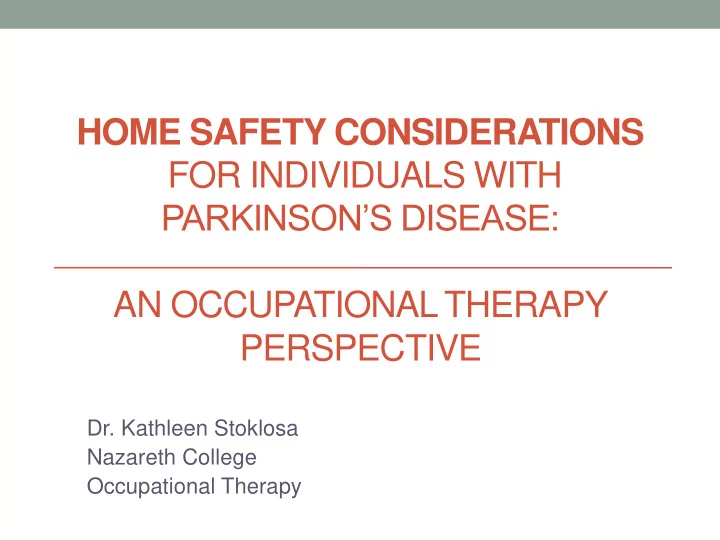

HOME SAFETY CONSIDERATIONS FOR INDIVIDUALS WITH PARKINSON’S DISEASE: AN OCCUPATIONAL THERAPY PERSPECTIVE Dr. Kathleen Stoklosa Nazareth College Occupational Therapy
OT Goals Maintain independence, interests, and roles • Safety issues • Hand Function • Mobility, especially in bathroom and kitchen • Feeding • Evaluate and address care partner needs • Educate
OT Intervention Focus on Activities & Participation • Environmental Modifications • Compensatory strategies: plan and structure day; time pressure management • Balance goals of client with caregiver time/burden!
PwPD report their top 5 of relevant problems: Case 2: Case 1: 1. Future expectations 1. Exercise 2. Medication 2. Sexuality 3. Support caregiver 3. Daily functioning 4. Daily routines and 4. Social environment structure 5. Nutrition
Types of Limitations • Slowness • Increased effort (energy) • Reduced self-confidence • Need for supervision/help • Unpredictability/ fluctuations • Safety concerns
Activity limitations as prioritized by PwPD 1. Mobility (walking, transfers, transportation) 2. Self care (dressing, eating/drinking, grooming) 3. Communication (e.g. using telephone, writing, using computer) 3. Leisure activities 4. Household activities 5. General tasks and demands (e.g. daily routines, dealing with stress, multitasking) 6. Work 7. Learning and applying knowledge (e.g. Problem-solving)
Participation • ‘Lifespace” • Becomes smaller and less diverse • More time at home • Reduced participation with others and in community
Problems impacting PwPD • Tremor • Mobility: Rigidity/Stiffness & Smaller/Slower movement • Postural instability • Fatigue • Cognition These impairments may contribute to safety concerns of: Spills , Falls, Accidents
Mobility deficits & Postural instability • Reduced arm swing • Head & trunk leaning forward • Shorter strides • Shuffling gait • Freezing Falls
Fatigue in PD • 33%-58% fatigue, often from early on • Impact on participation (work, social activities) • More than half of clients with fatigue indicate it is one of 3 most debilitating symptoms
Thinking Difficulties Affecting Functional Performance Cognitive impairments that mainly impact on occupational performance: Mental slowness/ difficulty switching Judging required time Reduced initiative, taking action
Simple Modifications for Safety at Home • Living Room • Kitchen • Bathroom • Bedroom
Living Room • Reduce clutter • No throw rugs! • Lighting! • Chairs with arms • Non-slip mats • Mark thresholds in doorways • Grab bar/handles with rest stops
Kitchen • Reorganize cupboards • Reorganize refrigerator • Adapted cooking equipment • Weighted utensils, cups • Non-skid bowls, plates, cups • Adapted plates
Bathroom • Non-skid mats • Bath seat • Tub bench • Grab bars, NOT towel bars! • Toilet frames with or without elevation
Bedroom • Good lighting • Silk sheets • Reusable transfer/mobility sheet • Bed rails, bed handles, bed pole • Firm mattress or adapt with wood • Chair with arms • Reorganize dresser and closet • Bedside commode, urinals for men & women
Outdoor Safety • Patios • Garage • Garden and Yard
Individualized Approach is BEST • No two people with PD are the same! • Therapists can make recommendations Occupational Therapy Physical Therapy Speech Therapy ...in Collaboration with your medical team
Recommend
More recommend